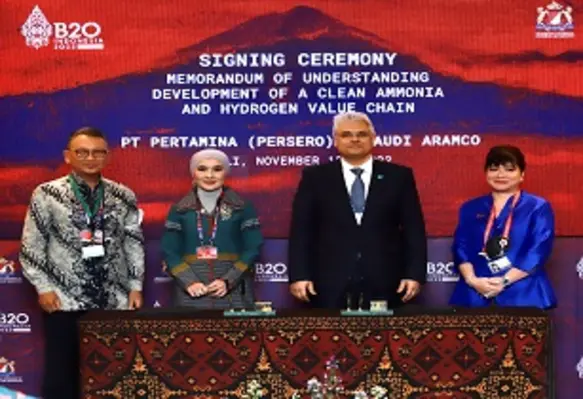Aramco, one of the world’s leading integrated energy and chemicals companies, and Indonesia’s PT Pertamina (Persero) have signed an memorandum of understanding (MoU) to explore collaboration across the hydrogen and ammonia value chain
The companies signed the MoU which outlines future cooperation across this key pathway of the energy transition, in a ceremony that took place alongside the B20 Summit in Bali.
The signing was performed by the president director of PT Pertamina (Persero), Nicke Widyawati, and Mohammed Y. Al Qahtani, Aramco senior vice president of Downstream.
Clean ammonia and hydrogen development have significant roles in Indonesia's 2060 net zero emissions roadmap and the country is expected to be a key player in green hydrogen production in Asia.
Al Qahtani, said, “As a company, our ambition is to achieve net-zero scope 1 and 2 greenhouse gas emissions across our wholly-owned operated assets by 2050. Our work in developing new ammonia and hydrogen energy pathways will be pivotal in achieving that goal while helping to advance an affordable, equitable and more sustainable transition for all.”
Widyawati, said, “The energy transition should not jeopardise energy security and affordability, especially for countries that are still dependent on fossil fuels. That's why Pertamina has developed a decarbonisation programme through CCUS. Hydrogen and Ammonia are expected to play a key role in a future climate-neutral economy, enabling emission-free power generation, heavy transport, heating and industrial processes.”
The MoU involves a pre-feasibility study that aims to assess the possibility of cooperation related to the development of a clean ammonia and hydrogen value chain. It includes potential carbon capture, utilisation and storage (CCUS) at Pertamina Group's existing facilities and other agreed potential locations. The study will explore investment viability and jointly develop commercialisation options, including but not limited to business organisation and commercial structures for clean ammonia and hydrogen in Indonesia.
The study is expected to be conducted over the next two years, and depending on outcomes, may be developed further.







